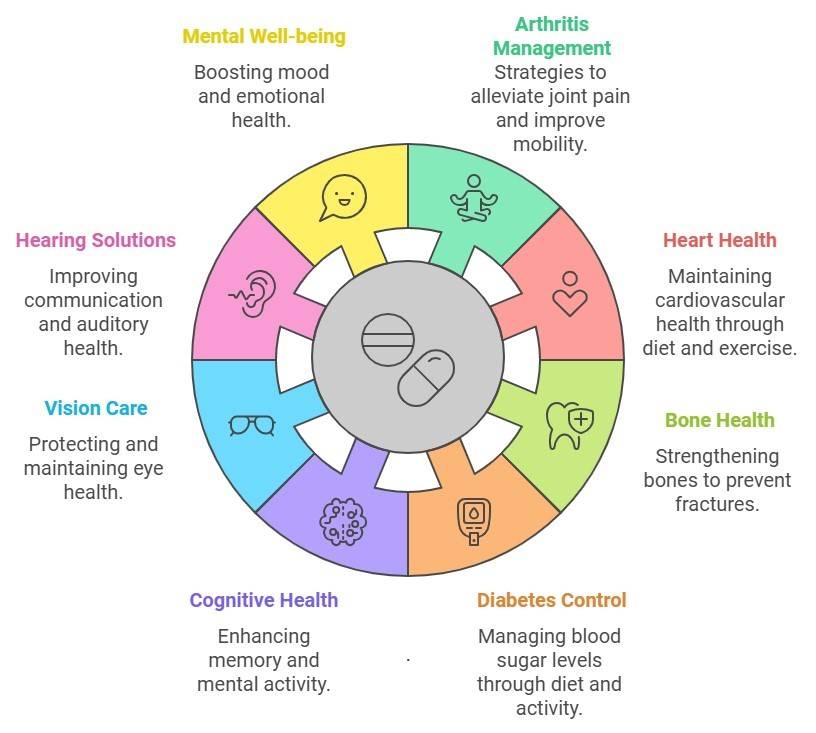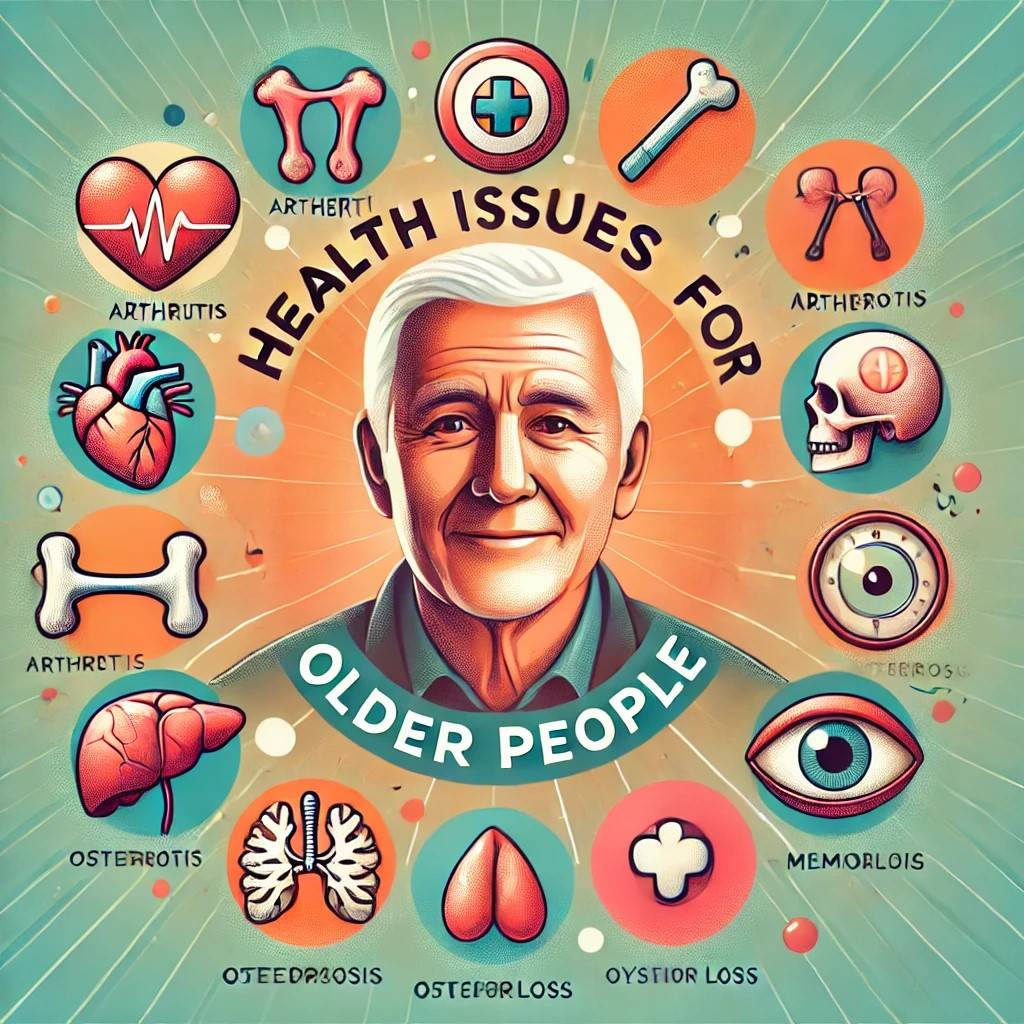15 Health Issues for Older People: Unlock the Secrets to Aging Well
Discover 15 common health issues for older people and learn expert tips to manage them. Unlock the secrets to aging well today—find out now!
Introduction
Aging is a natural part of life, and with it comes changes both in our bodies and in the way we live. For many older adults, these changes can bring challenges, particularly for health. However, by understanding common health concerns and learning how to manage them, aging can be a positive and fulfilling experience.
In this article, we’ll explore 15 common health issues for older people face and provide tips to help manage these conditions effectively. I’ve seen firsthand how the right strategies can improve the quality of life for seniors. Let’s delve into the details!
Understanding and Managing Health Issues for Older People

As people age, their risk of certain conditions rises. These elderly health problems often overlap, making them harder to manage. But with preventive care, early detection, and lifestyle adjustments, many of these conditions can be controlled. Below are the top 15 geriatric health issues and solutions to manage them.
1. Arthritis in the Elderly
Arthritis, a condition that causes joint pain, swelling, and stiffness, is one of the most common chronic diseases in seniors. It can make simple tasks like walking or holding a cup difficult.
- How to Manage Arthritis:
Low-impact exercises such as swimming or yoga can improve mobility. Anti-inflammatory diets, rich in omega-3 fatty acids, are helpful. For example, I’ve seen seniors benefit greatly by including fatty fish and walnuts in their diets. - Pro Tip: Joint pain creams and hot/cold packs can provide temporary relief. Don’t skip routine check-ups for arthritis management.
2. Heart Disease in Older Adults
Cardiovascular health in older adults is a serious concern, as heart disease remains one of the leading causes of death among seniors. High blood pressure, high cholesterol, and sedentary lifestyles are common risk factors.
- How to Maintain Heart Health:
Eat heart-friendly foods like oats, berries, and leafy greens. Regular moderate exercise—such as walking 30 minutes a day—can strengthen your heart. Avoid smoking and limit alcohol intake. - Personal Tip: My father started a daily brisk walking routine in his late 60s, and it helped reduce his blood pressure significantly.
3. Osteoporosis: Weak Bones
Osteoporosis weakens bones, making them more prone to fractures, especially in older women. It’s a silent condition, often diagnosed after a fracture.
- Bone Health Solutions:
Participate in weight-bearing activities, such as walking or light jogging. Eat calcium-rich foods such as dairy products and almonds and take vitamin D supplements if needed. Regular bone density tests are vital for early detection. - Example: I’ve tested simple chair exercises with seniors, and it’s amazing how much their balance and strength improved.
4. Diabetes in Aging Populations
Diabetes is a growing concern among older adults, affecting how the body processes sugar. It can lead to complications like nerve damage, kidney disease, and vision problems.
- Managing Diabetes:
Follow a diet with low-glycemic foods like whole grains, legumes, and leafy vegetables. Regular physical activity and monitoring blood sugar levels can prevent complications. - Pro Tip: Drinking enough water and staying hydrated plays a key role in keeping blood sugar levels stable.
5. Cognitive Decline and Memory Loss
As we age, memory problems like cognitive decline and even dementia may occur. Alzheimer’s is the most common cause of dementia, making it difficult for seniors to remember, think, or make decisions.
- Brain Health Strategies:
Stay mentally active with activities like puzzles, reading, or learning new hobbies. Social engagement is also crucial—attend group activities or call loved ones regularly. - Example: A close family friend started taking music lessons at 70, and it helped sharpen his memory while keeping him socially active.
6. Vision Problems in the Elderly
As people age, vision issues like cataracts, glaucoma, and macular degeneration frequently arise.
- Protecting Vision:
Wear sunglasses to block harmful UV rays, and schedule regular eye exams to detect issues early. A diet rich in vitamin A (found in carrots and sweet potatoes) promotes eye health. - Personal Insight: I’ve noticed seniors benefit greatly from lighting at home. Simple changes like brighter bulbs can reduce eyestrain.
7. Hearing Loss in Older Adults
Experiencing hearing loss can result in feelings of loneliness and aggravation. It’s common among older adults because of natural wear and tears on the ears.
- Solutions for Better Hearing:
Consider hearing aids or assistive listening devices. Regular ear cleanings and hearing tests can also make a big difference. - Note: Encourage seniors to participate in social gatherings to maintain confidence in communication.
8. Depression and Mental Health in Aging
Depression and anxiety are serious senior health concerns, often caused by loneliness, loss of loved ones, or health issues.
- Boosting Mental Health:
Stay connected with family and friends. Therapy or counselling can help process emotions. Regular physical activity also boosts mood naturally by releasing endorphins. - Example: A senior I know started volunteering at a local shelter, and it brought immense joy and purpose to their life.
9. Respiratory Issues in Seniors
Respiratory conditions like asthma and COPD (Chronic Obstructive Pulmonary Disease) are more common in seniors.
- How to Breathe Better:
Avoid smoking and reduce exposure to environmental pollutants. Use prescribed inhalers or breathing exercises to manage symptoms. - Pro Tip: Keeping houseplants that purify air, like snake plants, can create a healthier home environment.
10. Falls and Mobility Challenges
Falls are a significant risk for seniors because of weakened bones, poor balance, or vision issues.
- Preventing Falls:
Remove loose rugs, install grab bars, and ensure lighting at home. Strengthening exercises and physical therapy can improve balance. - Example: I’ve worked with seniors who use mobility aids like canes or walkers, and they reported feeling much safer.
11. Skin Conditions in Older Adults
Skin becomes thinner and drier with age, leading to issues like bruising, infections, or even skin cancer.
- Skin Care Tips:
Use gentle moisturizers and sunscreen daily. Avoid hot water during showers, as it dries the skin further. - Personal Experience: A neighbour had persistent dry skin issues that improved with simple changes like using fragrance-free products.
12. Sleep Disorders in Older Adults
Older adults frequently face challenges with insomnia or irregular sleep cycles
- Improving Sleep:
Maintain a consistent sleep routine. Avoid caffeine late in the day and create a comfortable sleep environment. - Pro Tip: A warm herbal tea before bed can promote relaxation. I’ve seen chamomile tea work wonders!
13. Nutritional Deficiencies
Older adults often face malnutrition because of poor appetite or difficulty chewing.
Eating Smart:
Preventive measures and timely intervention are essential.
- Smoothies are a successful way to add fruits, greens, and proteins for those with difficulty chewing.
14. Managing Medication
Many older adults take multiple medications, increasing the risk of side effects or confusion.
- Medication Management Tips:
Use a pill organizer and have a caregiver or pharmacist review medications regularly to avoid complications.
15. Aging Immune System
As we age, the immune system becomes weaker, making it harder to fight off infections.
- Boost Immunity:
Stay up to date with vaccines, including flu and pneumonia shots. Eating a balanced diet, staying active, and getting enough sleep also help.
Healthy Aging Strategies
Aging doesn’t have to mean declining health. Here are some healthy aging tips to stay strong and happy:
- Stay Active: Exercise keeps your body and mind strong. Even light activities like stretching or gardening help.
- Eat Right: A diet rich in nutrients helps prevent many common ailments in seniors.
- Stay Connected: Relationships matter. Spend time with family and friends to stay mentally sharp.
- Regular Check-Ups: Early detection of problems leads to better outcomes.
- Practice Self-Care: Relax with hobbies, meditation, or anything that makes you happy.
FAQs About Health Issues for Older People
What are the most common health issues for the elderly?
The most common health issues include arthritis, heart disease, diabetes, osteoporosis, cognitive decline, vision, and hearing problems, depression, and mobility challenges. These conditions often overlap, making regular medical care essential.
What changes occur in your body at the age of 60?
At 60, your body undergoes natural changes. Muscle mass decreases, bones may become weaker, and metabolism slows down. Skin loses elasticity, and the immune system may not work as effectively. However, a healthy lifestyle can slow down these effects.
What are the health issues of the aging population?
Aging populations commonly face chronic conditions like heart disease, diabetes, and arthritis. Cognitive issues, vision, and hearing loss, and mental health problems are also prevalent. Preventive care and early intervention are crucial.
What do seniors struggle with the most?
Seniors often struggle with mobility, chronic pain, loneliness, and managing multiple health conditions. Accessing healthcare, maintaining independence, and staying active can also be challenging.
Aging is a journey, and while it brings challenges, it also offers opportunities to focus on well-being. By understanding and addressing these common health issues, seniors can enjoy a higher quality of life. Remember, it’s never too late to adopt healthy habits and take control of your health.
Final Thoughts
Aging brings changes, but it also offers opportunities to focus on what matters. By understanding aging health concerns and adopting senior wellness strategies, seniors can live healthier, more fulfilling lives. Small steps, like regular exercise, healthy eating, and staying connected, can make a big difference.
Keep in mind, that it’s always possible to start prioritizing your health and well-being, regardless of your age.
Here’s to aging gracefully and enjoying every stage of life!
Recommended Reading
Mental Health Self-Care Tips: Boost Your Mood in 7 Simple Steps



